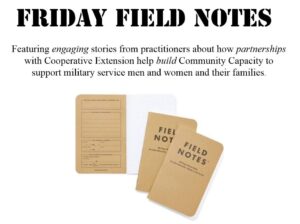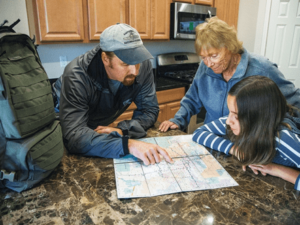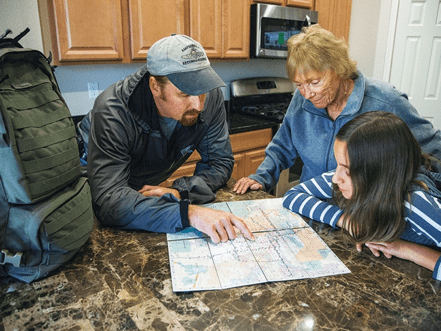
This week’s Friday Field Notes will focus on the OneOp Family Transitions (FT) team and the resources that the team offers related to disaster preparedness. The Family Transitions concentration area focuses on building resilience and navigating life cycle transitions that are unique to military families like deployments or permanent changes of station (PCS).

Family Transitions’ focus on resilience specifically is a relevant topic when addressing disaster preparedness since factors contributing to resilience can determine the outcome of an individual or family in the aftermath of a disaster. The Resilience Series presented in August of 2019 was a collaboration among Family Transitions, Family Development, and Network Literacy to present three webinars, the first of which, “Nurturing Individual Resilience from a Multisystem Developmental Perspective,” was hosted by Family Transitions. Presenter, Dr. Ann Masten, discussed perspectives on resilience and offered practical advice for service providers to promote resiliency. If you missed the event, you can still view the webinar recording.
As a follow-up to the webinar, be sure to view FT’s blog, “Resilience Matters for Military Families,” for a refresher on the key takeaway points from the event. Point #5 specifically addresses how service providers play a crucial role in fostering resilience, such as identifying the challenges that individuals are facing, identifying family strengths, assessing physical and mental health, promoting protective factors, and identifying resources in the community for support.
Going beyond the webinar, there are other practical ways for service providers to sharpen their skills to promote resilience after a disaster. Become familiar with behavioral health concerns that can occur as a result of a disaster including symptoms of distress and how to respond to those experiencing them with information from the US Department of Health & Human Services. The Substance Abuse and Mental Health Services Administration (SAMHSA) also has incredible resources for addressing behavioral health after trauma, such as a disaster distress helpline and a treatment locator. Learning about Psychological First Aid (PFA) is also a practical way for service providers to increase their knowledge and skills when responding to disasters.
Additional Resources from Family Transitions
Be sure to browse through some additional resources from the Family Transitions team related to promoting resilience that will hopefully inform your work with military families experiencing a disaster.
As you can see, OneOp Family Transitions has a wealth of knowledge and resources related to not only disaster preparedness, but how to foster resilience before, during, and after disaster events. The team even has a newsletter that you can subscribe to and you can also follow them on Twitter!















